2018年人教版英语八下Unit 3《Could you please clean your room》课件4
初中英语人教版八年级下册Unit 3 could you please clean

Unit 3 Could you please clean your room?Period 1 (Section A 1a—1c)Ⅰ. Teaching aimsⅰ.Learn the new expressions for different chores, like do the dishes, sweep the floor, take out the rubbish and so on. ⅱ.Learn to make polite requests using “Could you please…?”ⅲ.Encourage students to help their parents do chores.Ⅱ. Important and difficult keysImportant keysⅰ.Learn key words and expressions.ⅱ.Learn to make polite requests using “Could you please…?”Difficult keyHow to answer the question “ Could you please…?”Ⅲ. Teaching proceduresStep ⅰ Lead-in(ⅰ) Greet the students as usual(ⅱ) Ask students the meaning of “family”, it means ,“Father and mother ,I love you.”Next ,show students two questions, “Do you love your parents?”“Do you do chores at home?”Tell them do chores means do housework(做家务).They can answer the questions together.(ⅲ) Then , play a flash for students, ask them what it istalking about.Step ⅱ Presentation(ⅰ) New words and phrases.Show some pictures on the whiteboard, ask students to say what they are doing in Chinese, and then teach them the new phrases. Such as, do the dishes, take out the rubbish and so on, and read after me. At the same time, let them pay attention to some keys.(ⅱ) ChallengeShow the students some phrases in Chinese, ask some students to say out their English expressions, which can check teaching and learning.Step ⅲPractice(ⅰ) Look and sayThis activity aims to review the new phrases.There are some cards on the teacher’s desk. And at the corner of the classroom, there are some cleaning tools, too.First, tell students what to do in this activity and how to do it.Then, invite some students to perform in pairs. A student acts the other finds out the phrase. Next, put up the cards on the blackboard one by one. At the same time, add a new phrase,mop the floor(拖地).Also, ask a student to take out the rubbish, I can give her three sentences,“Take out the rubbish.”“Please take out the rubbish.”“Could you please take out the rubbish?”According to her responses, let students choose a more polite sentence. Finally, introduce the structure “Could you please…?” Tell them when we want to make polite requests, we can use the structure “Could you please…?”and we can make conversations like this ,A: Could you please...?B: Yes, sure. / All right. /No problem. / Certainly.So rry, I can’t. I have to do...Sorry, I can’t. I am doing...Show students conversations, let them know how to response.(ⅱ) Invite some students to answer questions using “Yes./ Sure. / All right. ”“ Sorry, I have to…”and so on. StepⅳListeningActivity 1bRead the instruction. Point to the chart, show students the columns with the heading Peter’s mother and Peter.Tell students that they will hear a conversation between Peter and his mother. They have to listen to the recordingcarefully and check the chores Peter’s mother or Peter does.Play the recording the first time. Students only listen.Then play a flash, ask students to check their answers.Later correct the answers.Step ⅴ Pair workActivity 1cTell students today is their house Clean-up Day. Make conversations between them and their parents using the new phrases and structures.Give them several minutes to do it. Then invite some pairs to act it out for the class.StepⅵConsolidationDo some exercises for consolidation.StepⅶSummaryIn this period, we’ve learned how to make polite requests. Through some listening and speaking practice, we consolidated The target language and we know we should love our parents and help them with housework at home.Step ⅷHomework(ⅰ) Remember the new phrases.(ⅱ) Learn to how to use the new structure.。
人教版八年级下英语Unit 3 Could you please cleanyourroom知识总结
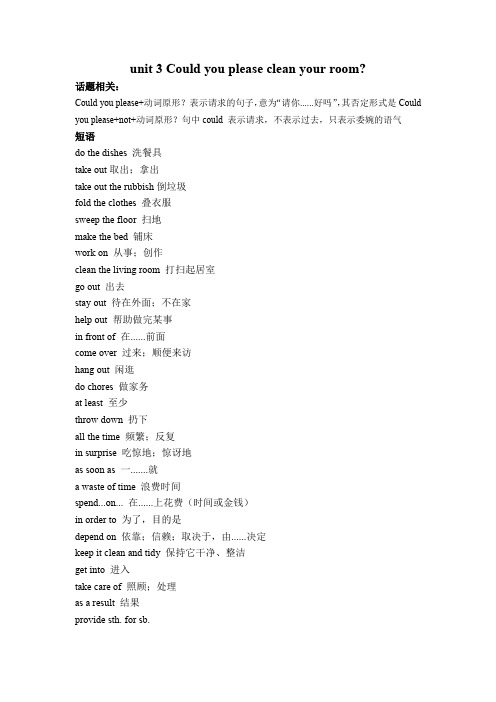
unit 3 Could you please clean your room?话题相关:Could you please+动词原形?表示请求的句子,意为“请你......好吗”,其否定形式是Could you please+not+动词原形?句中could 表示请求,不表示过去,只表示委婉的语气短语do the dishes 洗餐具take out取出;拿出take out the rubbish倒垃圾fold the clothes 叠衣服sweep the floor 扫地make the bed 铺床work on 从事;创作clean the living room 打扫起居室go out 出去stay out 待在外面;不在家help out 帮助做完某事in front of 在......前面come over 过来;顺便来访hang out 闲逛do chores 做家务at least 至少throw down 扔下all the time 频繁;反复in surprise 吃惊地;惊讶地as soon as 一.......就a waste of time 浪费时间spend...on... 在......上花费(时间或金钱)in order to 为了,目的是depend on 依靠;信赖;取决于,由......决定keep it clean and tidy 保持它干净、整洁get into 进入take care of 照顾;处理as a result 结果provide sth. for sb.=provide sb. with sth. 为某人提供某物a developed country 一个发达国家a developing country 一个发展中国家a life of independence 独立的生活an independent country 一个独立自主的国家have no idea “不知道”=don't knowtake care of “照顾;处理”=look after=care for take good care of “好好照顾......”=look after.....well as a result 结果;因此as a result of 由于.......;作为......结果句型和固定结构finish doing sth. 做完某事neither+连系动词be/助动词/情态动词+主语. .....也不hate to do sth. 厌恶做某事let sb. do sth. 让某人做某事spend...doing sth. 花费......做某事provide sth. for sb. 向某人提供某物learn to do sth. 学会做某事learn how to do sth. 学会怎样做某事do one's part in (doing) 尽自己的职责做某事as.....as... 与.......一样not as/so...as... 不如......borrow sth. from sb. “向某人借某物”hate sb./sth. 讨厌某人/某物hate to do sth./doing sth. 厌恶做某事enjoy doing sth 喜欢做某事buy sb.sth.=buy sth. for sb. "给某人买某物invite sb. to +地点名词“邀请某人到某地”invite sb. to do sth. “邀请某人做某事”make sb. do sth. 让/使某人做某事help with sth. =help (to) do sth.帮忙做某事There is no need for sb. to do sth.“对于某人来说,没有必要做某事”解释minute n.分钟;片刻(1)any minute now “随时;马上;在任何时刻”,表示事情有可能在极短的时间内发生或眼下就要发生。
(完整版)英语人教版八年级下册Unit3Couldyouplease--
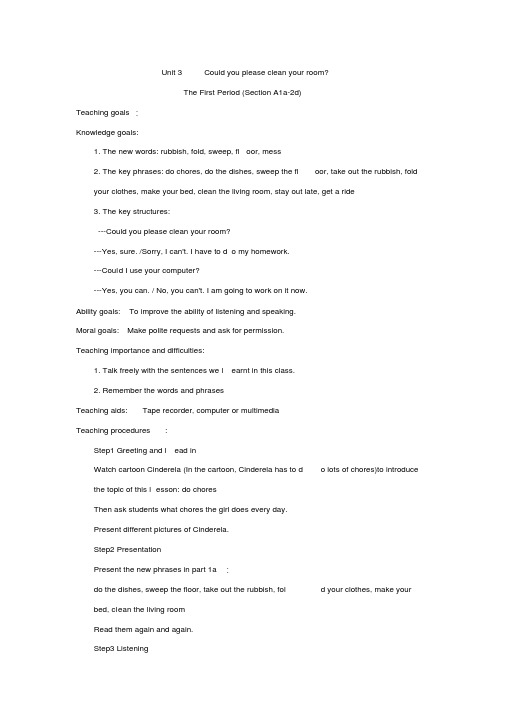
Unit 3 Could you please clean your room?The First Period (Section A1a-2d)Teaching goals:Knowledge goals:1. The new words: rubbish, fold, sweep, fl oor, mess2. The key phrases: do chores, do the dishes, sweep the fl oor, take out the rubbish, foldyour clothes, make your bed, clean the living room, stay out late, get a ride3. The key structures:---Could you please clean your room?---Yes, sure. /Sorry, I can't. I have to d o my homework.---Could I use your computer?---Yes, you can. / No, you can't. I am going to work on it now.Ability goals: To improve the ability of listening and speaking.Moral goals: Make polite requests and ask for permission.Teaching importance and difficulties:1. Talk freely with the sentences we l earnt in this class.2. Remember the words and phrasesTeaching aids: Tape recorder, computer or multimediaTeaching procedures :Step1 Greeting and l ead inWatch cartoon Cinderela (In the cartoon, Cinderela has to d o lots of chores)to introduce the topic of this l esson: do choresThen ask students what chores the girl does every day.Present different pictures of Cinderela.Step2 PresentationPresent the new phrases in part 1a:do the dishes, sweep the floor, take out the rubbish, fol d your clothes, make your bed, cl ean the living roomRead them again and again.Step3 ListeningT: Peter’s room is untidy, peter and his mother are at home, what shoul d they d o?chores or Mom’s chores?1. Now listen to the tape player, then finish part 1b. Peter’sListen it the first time, and check the answers2. Listen it again, then pay attention to the question:T: How does Mum ask peter to help her?----Could you please …?----Yes, sure. / Sorry, I can’t, I have to…Step 4 Pair workLook at the picture in 1a, ask your partner to d o the chores that you see.Example:A: Could you please sweep the fl oor?B: Yes, sure. Can you d o the dishes?ean the living room.A: Well, could you please do them? I ‘m going to clB: No problem.Step 5 Listening1. Look through the tasks in 2a and 2b carefully before listening.2. Play the tape the first time, let the students finish part 2a3. Play the tape the second time and let the stud ents finish the tasks 2b.4. Listen to the tape once more and ask the students to repeat after the tape and checkthe answers by themselves.Question: How to ask for permission?总结请求许可时,常用句型:---Could I…?---Yes, you can. / Sorry, you can’t.Step 6 Group workfather, Peter asks his father if he can do three Student A is Peter, Student B is Peter’smore t hings. Say “yes” or “no”, and give a reason. Such as:A: Could I use your computer?B: Sorry. I’m going to work on it now.A : Well, could I watch TV?B: Yes, you can. But first you have to clean your roomStep 7 Self-studyAsk the students to learn 2d by themselves and finish the tasks of self-study.1. Let students read the conversation loudly, then come up with some questions. Thestudent who raises a question will get 2 points. And the student who answers it will get1 point.2. Read it carefully, then find out the new words and difficult points. Let students showthem in class.3. Role-play the conversation in groups.Step 8 Language points1.Tony, could you please help out with a few things?help out (with something) 是一个动词短语, 表示在某人繁忙或是遇到困难时“给予帮助”。
人教版英语八年级下册Unit3《Couldyoupleasecleanyourroom》说课稿
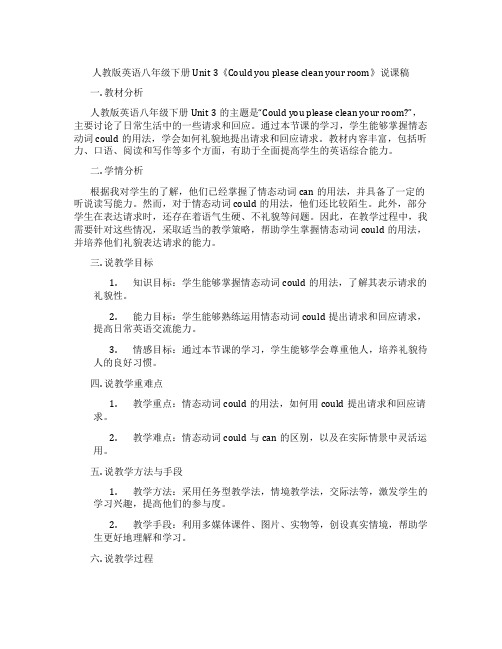
人教版英语八年级下册Unit 3《Could you please clean your room》说课稿一. 教材分析人教版英语八年级下册Unit 3的主题是“Could you please clean your room?”,主要讨论了日常生活中的一些请求和回应。
通过本节课的学习,学生能够掌握情态动词could的用法,学会如何礼貌地提出请求和回应请求。
教材内容丰富,包括听力、口语、阅读和写作等多个方面,有助于全面提高学生的英语综合能力。
二. 学情分析根据我对学生的了解,他们已经掌握了情态动词can的用法,并具备了一定的听说读写能力。
然而,对于情态动词could的用法,他们还比较陌生。
此外,部分学生在表达请求时,还存在着语气生硬、不礼貌等问题。
因此,在教学过程中,我需要针对这些情况,采取适当的教学策略,帮助学生掌握情态动词could的用法,并培养他们礼貌表达请求的能力。
三. 说教学目标1.知识目标:学生能够掌握情态动词could的用法,了解其表示请求的礼貌性。
2.能力目标:学生能够熟练运用情态动词could提出请求和回应请求,提高日常英语交流能力。
3.情感目标:通过本节课的学习,学生能够学会尊重他人,培养礼貌待人的良好习惯。
四. 说教学重难点1.教学重点:情态动词could的用法,如何用could提出请求和回应请求。
2.教学难点:情态动词could与can的区别,以及在实际情景中灵活运用。
五. 说教学方法与手段1.教学方法:采用任务型教学法,情境教学法,交际法等,激发学生的学习兴趣,提高他们的参与度。
2.教学手段:利用多媒体课件、图片、实物等,创设真实情境,帮助学生更好地理解和学习。
六. 说教学过程1.导入:通过播放一段关于孩子们日常生活的视频,引出本节课的主题“Could you please clean your room?”。
2.新课呈现:介绍情态动词could的用法,并通过例句展示如何用could提出请求和回应请求。
初中英语人教版八年级下册Unit 3 Could you please clean
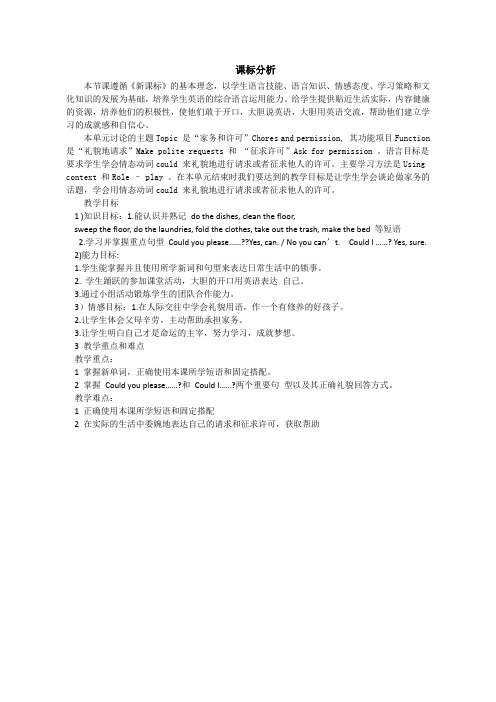
课标分析本节课遵循《新课标》的基本理念,以学生语言技能、语言知识、情感态度、学习策略和文化知识的发展为基础,培养学生英语的综合语言运用能力。
给学生提供贴近生活实际,内容健康的资源,培养他们的积极性,使他们敢于开口,大胆说英语,大胆用英语交流,帮助他们建立学习的成就感和自信心。
本单元讨论的主题Topic 是“家务和许可”Chores and permission, 其功能项目Function 是“礼貌地请求”Make polite requests 和“征求许可”Ask for permission 。
语言目标是要求学生学会情态动词could 来礼貌地进行请求或者征求他人的许可。
主要学习方法是Using context 和Role – play 。
在本单元结束时我们要达到的教学目标是让学生学会谈论做家务的话题,学会用情态动词could 来礼貌地进行请求或者征求他人的许可。
教学目标1 )知识目标:1.能认识并熟记do the dishes, clean the floor,sweep the floor, do the laundries, fold the clothes, take out the trash, make the bed 等短语2.学习并掌握重点句型Could you please……??Yes, can. / No you can’t. Could I ……? Yes, sure.2)能力目标:1.学生能掌握并且使用所学新词和句型来表达日常生活中的锁事。
2. 学生踊跃的参加课堂活动,大胆的开口用英语表达自己。
3.通过小组活动锻炼学生的团队合作能力。
3)情感目标:1.在人际交往中学会礼貌用语,作一个有修养的好孩子。
2.让学生体会父母辛劳,主动帮助承担家务。
3.让学生明白自己才是命运的主宰,努力学习,成就梦想。
3 教学重点和难点教学重点:1 掌握新单词,正确使用本课所学短语和固定搭配。
人教新目标版英语八下Unit 3《Could you please clean your room》

人教新目标版英语八下Unit 3《Could you please clean your room》教学设计1一. 教材分析人教新目标版英语八下Unit 3主要讲述了日常生活中的一些请求和回应。
通过本节课的学习,学生能够掌握情态动词could的用法,以及如何用英语礼貌地提出请求和表达意见。
本课的主要场景是一个孩子在请求妈妈打扫房间,而妈妈则提出了一些意见。
教材通过这个场景,让学生学会如何使用情态动词could来提出请求和表达意见。
二. 学情分析在进入本节课的学习之前,学生已经学习了情态动词can的用法,对情态动词有一定的了解。
同时,学生也掌握了基本的日常英语交流用语。
因此,在教学过程中,教师可以借助学生已有的知识储备,引导学生更好地理解和掌握情态动词could的用法。
三. 教学目标1.学生能够掌握情态动词could的用法,并能够用其提出请求和表达意见。
2.学生能够听懂、会说、会读、会写与本节课相关的词汇和句子。
3.学生能够通过本节课的学习,提高英语口语表达能力和日常交流能力。
四. 教学重难点1.教学重点:情态动词could的用法,以及与之相关的词汇和句子。
2.教学难点:情态动词could在不同情境下的正确运用,以及英语礼貌表达请求和意见的方法。
五. 教学方法1.情境教学法:通过设定情境,让学生在实际语境中学习、理解和运用情态动词could。
2.交际法:通过学生之间的互动,引导学生运用情态动词could进行实际交流。
3.任务型教学法:通过完成具体任务,让学生在实践中掌握情态动词could的用法。
六. 教学准备1.教学课件:制作与本节课相关的课件,包括图片、视频、音频等素材。
2.教学道具:准备与本节课场景相关的道具,如玩具房间、清洁工具等。
3.练习题:准备与本节课内容相关的练习题,用于巩固所学知识。
七. 教学过程1.导入(5分钟)教师通过与学生进行简单的英语交流,引导学生进入学习状态。
然后,教师提出一个问题:“你们在家里有没有让爸爸妈妈帮忙做过事情?是如何请求他们的?”让学生思考并简要回答。
人教版 八年级英语 下册 Unit3Could_you_please_clean_your_room
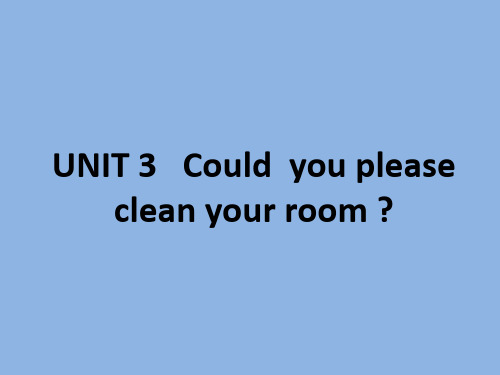
invite my friends to a party
go to the store use your CD player
Listen to a conversation between Sandy
a party? Parent: No, you can’t have a party.
You have a test on Monday.
Parent: Could you please…? Child: Yes, sure. / Sorry, I can’t. I
have to ...
clean your room
parents
5. go to the store 6. use your CD player 7. take out the rubbish
parents 8. make your bed
1b Use the phrases in 1a to make
conversations.
Parent: Could you clean your room? Child: Yes, I can. Child: Could I invite my friends to
Li Lei can’t dance , neither can I. neither can Mary. neither can we.
Neither of …是both of … 的否定句 Both of my parents are teathers .(否定句) Neither of my parents is a teacher .
英语人教版八年级下册Unit3 Could you please clean

1. d 2. a 3. c 4. e 5. b
2. 4b
Fill in the blanks.
3. Make a list of things your group need to do for a camping trip. Then discuss who will do them and complete the chart.
3.学会使用以下句型:
1) Why wasNancy’s mom angry withNancy?
2) You watch TV all the time and never help out around the house.
3) I can’t work all day and do housework all evening.
(4) I’m just as tired as you.
(5) My mom did not say anything and walked away.
(6) Neither of us did any house work for a week.
(7) Could I borrow that book?
1)学习并掌握新词汇:
throw; all the time; neither; shirt; pass; borrow; lend; finger; hate; while
2)能正确使用以下常用表达:
throw down; come over; all the tome; help out; shout back; in surprise; neither of us; as soon as; pass sb. sth.=pass sth. to sb.; borrow sth. from sb.; lend sb. sth.; hate to do sth.
2018年人教版英语八下Unit 3《Could you please clean your room》课件8
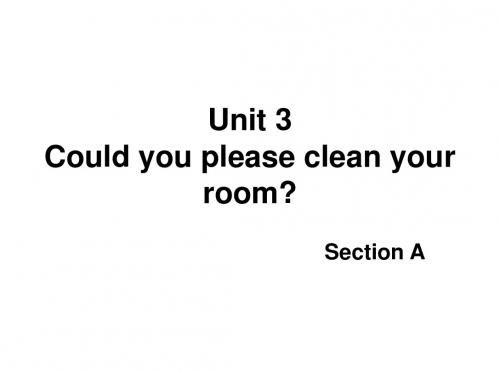
do chores
take out the trash
Task 2
• What chores do you have at home?
• Who often does the chores? • How often do your family do them?
Task 3
• Listen to the tape, and write “M” next to Mom’s chores and “P” next to Peter’s chores. Chores do the dishes sweep the floor take out the trash Peter’s chore or Mom’s chu please clean your room?
Section A
Task 1
• What are they doing now?
cleaning the room
do the dishes
sweep the floor
make the bed
do the laundry
Task 5
• Work in pairs, and finish following chart.
Chores Who How often every day twice a month …
do the dishes mother cooking … father …
…
…
…
Task 6
• Listen to the tape. And check “yes” or “no”. • What does his father say? Peter wants to… Peter’s father says… Go to the movies Yes No Stay out late Yes No His father’s reasons I have to go to a meeting. You have to clean your room I need to eat breakfast. You have a test tomorrow.
(完整版)英语人教版八年级下册Unit3Couldyouplease--
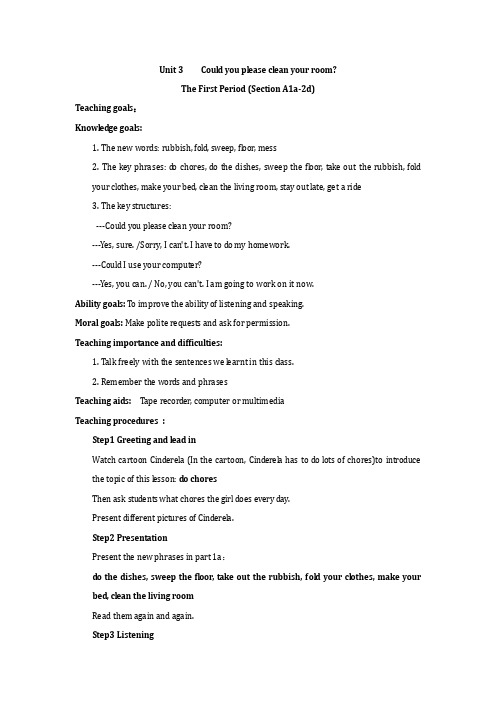
Unit 3 Could you please clean your room?The First Period (Section A1a-2d)Teaching goals:Knowledge goals:1. The new words: rubbish, fold, sweep, fl oor, mess2. The key phrases: do chores, do the dishes, sweep the fl oor, take out the rubbish, foldyour clothes, make your bed, clean the living room, stay out late, get a ride3. The key structures:---Could you please clean your room?---Yes, sure. /Sorry, I can't. I have to d o my homework.---Coul d I use your computer?---Yes, you can. / No, you can't. I am going to work on it now.Ability goals: To improve the ability of listening and speaking.Moral goals: Make polite requests and ask for permission.Teaching importance and difficulties:1. Talk freely with the sentences we l earnt in this class.2. Remember the words and phrasesTeaching aids: Tape recorder, computer or multimediaTeaching procedures :Step1 Greeting and l ead inWatch cartoon Cinderela (In the cartoon, Cinderela has to d o lots of chores)to introduce the topic of this l esson: do choresThen ask students what chores the girl does every day.Present different pictures of Cinderela.Step2 PresentationPresent the new phrases in part 1a:do the dishes, sweep the floor, take out the rubbish, fol d your clothes, make your bed, cl ean the living roomRead them again and again.Step3 ListeningT: Peter’s room is untidy, peter and his mother are at home, what shoul d they d o?1. Now listen to the tape player, then finish part 1b. Peter’s chores or Mom’s chores? Listen it the first time, and check the answers2. Listen it again, then pay attention to the question:T: How does Mum ask peter to help her?----Could you please …?----Yes, sure. / Sorry, I can’t, I have to…Step 4 Pair workLook at the picture in 1a, ask your partner to d o the chores that you see. Example:A: Coul d you please sweep the fl oor?B: Yes, sure. Can you d o the dishes?A: Well, coul d you please do them? I ‘m going to cl ean the living room.B: No problem.Step 5 Listening1. Look through the tasks in 2a and 2b carefully before listening.2. Play the tape the first time, let the students finish part 2a3. Play the tape the second time and let the stud ents finish the tasks 2b.4. Listen to the tape once more and ask the students to repeat after the tape and check the answers by themselves.Question: How to ask for permission?总结请求许可时,常用句型:---Coul d I…?---Yes, you can. / Sorry, you can’t.Step 6 Group workStudent A is Peter, Stud ent B is Peter’s father, Peter asks his father if he can do three more t hings. Say “yes” or “no”, and give a reason. Such as:A: Could I use your computer?B: Sorry. I’m going to work on it now.A : Well, coul d I watch TV?B: Yes, you can. But first you have to clean your roomStep 7 Self-studyAsk the students to learn 2d by themselves and finish the tasks of self-study.1. Let stud ents read the conversation l oudly, then come up with some questions. Thestudent who raises a question will get 2 points. And the student who answers it will get1 point.2. Read it carefully, then find out the new words and difficult points. Let students showthem in class.3. Role-play the conversation in groups.Step 8 Language points1.Tony, could you please help out with a few things?help out (with something) 是一个动词短语, 表示在某人繁忙或是遇到困难时“给予帮助”。
英语人教版八年级下册Unit3 Could you please clean
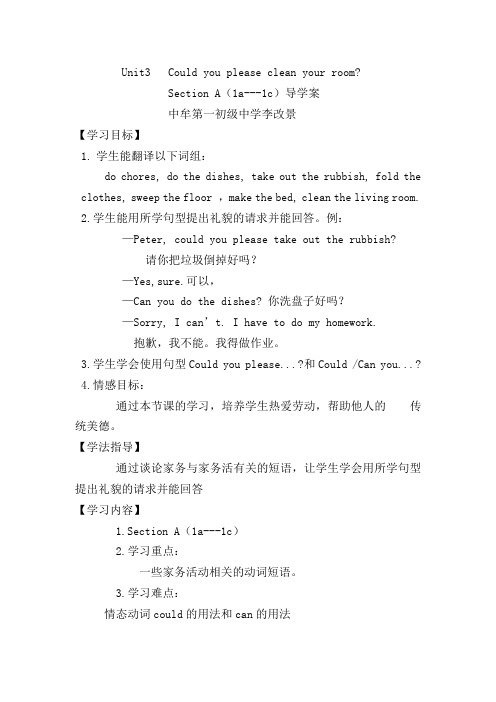
Unit3 Could you please clean your room?Section A(1a---1c)导学案中牟第一初级中学李改景【学习目标】1.学生能翻译以下词组:do chores, do the dishes, take out the rubbish, fold the clothes, sweep the floor ,make the bed, clean the living room.2.学生能用所学句型提出礼貌的请求并能回答。
例:—Peter, could you please take out the rubbish?请你把垃圾倒掉好吗?—Yes,sure.可以,—Can you do the dishes? 你洗盘子好吗?—Sorry, I can’t. I have to do my homework.抱歉,我不能。
我得做作业。
3.学生学会使用句型Could you please...?和Could /Can you...?4.情感目标:通过本节课的学习,培养学生热爱劳动,帮助他人的传统美德。
【学法指导】通过谈论家务与家务活有关的短语,让学生学会用所学句型提出礼貌的请求并能回答【学习内容】1.Section A(1a---1c)2.学习重点:一些家务活动相关的动词短语。
3.学习难点:情态动词could的用法和can的用法4.教学过程:Task1.自主学习,整体感知1.预习检测:试读单词,解决语音问题。
2. 查阅并翻译下面的短语动词1) 整理床铺_______________ 2)打扫起居室_______________3) 洗餐具 _______________ 4) 倒垃圾_______________5)扫地_______________ 6)做家务_______________Task2、合作交流,文本探究1.讨论课本P17图片,思考以下问题,Who are the two people in the picture?Why do you say so? Where are they?What housework is the mother asking Peter to do?然后结合幻灯片学习短语2.Guessing game:What chore is she/he doing?3.看课本1a, Ask:Do you do these chores at home? Write”Y”for “yes” or “N” for “no”.师生问答。
英语人教版八年级下册Unit 3 Could you please clean.doc

人教版新目标八年级(下)Unit 3 Could you please clean your room?Section A 1a-2d(第一课时)大荔实验中学李瑛【设计思路】本节课的内容比较贴近学生生活实际,教学中以听说训练为主。
为此,设计以下活动:1、利用chant的形式使学生牢记家务活相关的动词词组2、采用任务型教学法进行听力训练3、通过结对活动和小组活动获得对目标语言的运用能力。
【教学目标】1.让学生掌握一些常用的动词词组。
2.学会礼貌地提出请求。
3.学会使用句型Could you please…?【教学重点】1.掌握一些家务活动相关的动词短语。
2.掌握情态动词could的用法。
【教学难点】情态动词could的用法【教学方法】运用任务型教学法与问答式教学法为主,从而逐渐突破本课的重点和难点。
【学法指导】遵循“教为主导,学为主体,练为主线”的教学思想,通过学生的自主探究,积极参与与合作交流,掌握礼貌提出请求的表达法并会灵活运用。
【教学过程】自学(自主学习,明确目标)一、查阅下面的动词短语(学法指导:请同学们先独立完成,然后小组交流讨论,1、3、5、7组黑板展示,2、4、6、8组先点评,然后再译成汉语,并口头展示。
)1.洗餐具 _____________________2. 叠衣服 ___________________3.打扫起居室 _________________4.倒垃圾 ___________________5.整理床铺 ___________________6.扫地 ____________________二、借助媒介,正音操练(热身活动:Talk about some chores.)Games:练习有关家务的短语。
Bed, bed, make the bed; Floor, floor, sweep the floor;Dishes, dishes, do the dishes; Clothes, clothes, fold the clothes;Rubbish, rubbish, take out the rubbish;Chores, chores, I like doing chores.研学(合作探究,我能理解)一、预习语言点1. — Peter, could you please take out the rubbish? 请你把垃极倒掉好吗?—Sure, Mom.可以,妈妈。
英语人教版八年级下册Unit3-Could-you-please-cle

Unit 3 Could you please clean your room?Section B一、教材分析本课其主目标是能用“Could you please do things?”“Could I please do things?”谈论如何委婉地提出请求或征求别人的许可, 及回答语“Sure / Certainly / I’m glad to .”能礼貌地拒绝,“Sorry, I / you can’t,. I / you have to do…”并表达自己的理由, 陈述自己的好恶。
以do housework 和调查做力能所及的事为话题,学会运用“Could you pleasedo things?”“Could I please do things?”是本课的语言目标。
二、教学目标词汇invite my friends to …,buy some drinks and ,snacks, borrow some money r, teenager disagree掌握句型 .---Could you please buy some drink and snacks?---Sure. / Yes, I can.--- Could I borrow your money?---Yes, you can.. Sorry, you can’t.三、难点综合的运用单元的目标语针对实际情景解决问题.四、教学准备复习动词短语,并且预习生词, 游戏用的卡片小奖品五、教学过程1.Revision: 1aThis activity introduces the key vocabulary.Read the instructions in 1a. Read the items in the chart. And then fill in the charton their own.Correct the answers.2. Discussion(在屏幕上展示出刚才的动词短语) .,1a What can teenagers ask their parents to do? What do parents ask their teenagers to do? 学习用I agree/ disagree 表示自己的观点.T: Come to the front , talk about your ideas.(.这个任务地目标运用词汇进行表达, 同时渗透了对学生爱的教育,,爱父母,爱家庭,爱劳动.)A:I think teenagers …B:I agree./ I don’t agree(disagree). I think …2). Sally’s weekend.Ask: What chores does Sally do on weekends? What do you think of Sally? Then Showsome photos of Sally.Step 2. PairworkMake your own conversations about the items in activity 1a.T: Teenagers say, Could you clean your room ?S: No, I disagree. Parents say, Could you clean your room?Do a second example if the students wish.Then the students work in pairs.Ask several pairs to say their conversations to the class.3. A gamePractice with “Could you please …?”“Could I …?”将课前准备的双色卡片(如:红/蓝)分发给学生,卡片以字母编号,同一编号的有两张,上面有简笔画,规定获得红色卡片的学生先发问,根据卡片上的简笔画回答。
人教版八年级英语下册《Unit3 Could you please clean your room》

人教版八年级英语下册《Unit3 Could you please clean your room》教学设计(第5课时)一. 教材分析人教版八年级英语下册《Unit3 Could you please clean your room》主要围绕日常生活场景展开,培养学生的日常交流能力和表达能力。
本节课时主要学习一般现在时的被动语态,通过一个关于孩子们做家务的对话,让学生理解和运用一般现在时的被动语态。
二. 学情分析八年级的学生已经掌握了基本的英语语法和词汇,具备一定的听说读写能力。
但对于一般现在时的被动语态可能还比较陌生,需要通过大量的练习来掌握。
同时,学生可能对家务话题感兴趣,可以激发他们的学习积极性。
三. 教学目标1.能理解一般现在时的被动语态的构成和用法。
2.能用一般现在时的被动语态进行日常交流。
3.能听懂、说出一篇关于家务话题的对话。
四. 教学重难点1.一般现在时的被动语态的构成和用法。
2.如何运用一般现在时的被动语态进行日常交流。
五. 教学方法采用任务型教学法,通过大量的练习和实际操作,让学生在实践中掌握一般现在时的被动语态。
同时,采用情境教学法,创设日常生活中的场景,让学生在真实的环境中学习和运用英语。
六. 教学准备1.PPT课件2.相关家务话题的图片七. 教学过程1.导入(5分钟)利用图片引入家务话题,让学生猜测图片中的人物在做什么,激发学生的学习兴趣。
2.呈现(10分钟)通过PPT课件展示一般现在时的被动语态的构成和用法,让学生初步了解一般现在时的被动语态。
3.操练(10分钟)让学生分成小组,根据PPT课件上的例子,用一般现在时的被动语态进行问答,加强学生对一般现在时的被动语态的运用。
4.巩固(10分钟)让学生听录音,跟读对话,模仿语音语调,巩固所学内容。
5.拓展(10分钟)让学生编写一段对话,话题不限,要求运用一般现在时的被动语态。
6.小结(5分钟)对本节课所学内容进行小结,强调一般现在时的被动语态的构成和用法。
人教版英语八下Unit 3《Could you please clean your room》

What kind of chores(家务) do you know in English?
Discussion 妈妈的好帮手
你在家常帮妈妈做家务吗? • What chores do you have at home?
• Who often does the chores?
• How often do your family do them?
Yes ,sure.
Could you please clean the the living room ?
No, I can’t
A: Could you please clean the room ? B: Yes, sure. No/Sorry, I can't .
clean the room
Jane
Do you clean your room everyday?
water the flowers
Wash the car
clean the room
make dinner
do the dishes
sweep the floor
mop the floor
take out the trash
1b Listen. What kind of chores do Mom
and Peter do? Check( )Mom or Peter.
Chores
Do the dishes Sweep the floor
Mom
Peter
Take out the trash
Make your bed Fold your clothes Clean the living room
Could • 1.______you please clean your room? sweeps • 2.Jerry's mom ______the floor every Sunday. living room • 3.There is a TV in the ___________. • 4.Judy _______hard in a hospital.She is a works nurse. • 5.Sam's father is a policeman. He's busy.So Sam ________ to do the chores. has
- 1、下载文档前请自行甄别文档内容的完整性,平台不提供额外的编辑、内容补充、找答案等附加服务。
- 2、"仅部分预览"的文档,不可在线预览部分如存在完整性等问题,可反馈申请退款(可完整预览的文档不适用该条件!)。
- 3、如文档侵犯您的权益,请联系客服反馈,我们会尽快为您处理(人工客服工作时间:9:00-18:30)。
Sandy is going to have a party, too.
Sandy
2a Listen and check() the things in 1a that
Period 3
Section B 1a-2c
1 3
2
4
1 3
2
4
1
2
3
4
A: What kind of chores do you do at home ? B: I often clean the room , do the dishes, fold my clothes and cook dinner at home. A: Do you like them ? Why ? B: Yes, I like cleaning the room. Because it is very exciting . But I don't like folding my clothes . Because it is very boring .
What
buy drinks and snacks invite my friends, borrow some money clean her room, use the CD player
Sandy and move the good chairs to the bedroom, Dave clean the living room
8. make your bed
2b Listen again. What is Sandy’s mom going to
do? What is Sandy going to do? What are Sandy and Dave going to do? Fill in the chart.
Who Sandy’s mom Sandy
What should you do before the party?
bo go bu do bo ta
in
cl
borrow some money
go to the store
buy some drinks and snacks
snacks
A
B
invite friends to the party teenager (13-19)
you hear.
1. buy some drinks and snacks 2. borrow some money
3. clean your room
4. invite my friends to a party 5. go to the store 6. use your CD player 7. take out the trash
A : What chore do I like doing ?
cook the dinner
A : What chore do I like doing ?
do the laundry
You did very well !
Christmas Day
December 25
If you are having a party ,what should you do ?
make the bed
A : What chore do I like doing ?
clean the room
A : What chore do I like doing ?
fold the clothes
A : What chore பைடு நூலகம்o I like doing ?
take out the trash
invi te
do the dishes
clean the living room
take out the trash
borrow a VCD/DVD player
Sandy is going to have a party,
Sandy
parents
teenagers
Teenagers/parents
1 4
2 5
3
Who’s lucky and good?
6
8
7
A : What chore do I like doing ?
do the dishes
A : What chore do I like doing ?
sweep the floor
A : What chore do like doing ?
parents
8. make your bed
1 clean your room 2 go to the store 3 take out the trash 4 make your bed
1b Could you please Yes, I can /No, I can’t
Could I please Yes, you can/No, you can’t
2c
You are having a party . Ask your partner for help . Talk about these things .
A : Could you take out the trash ? B: Yes, sure ./No, I can't . I have to do my homework first .
parents
parents
teenagers
patents
.
teenager
teenagers/parents1. buy some drinks and snacks 小吃,快餐 teenagers 2. borrow some money 借 parents 3. clean your room teenagers parents teenagers parents 4. invite my friends to a party 邀请 5. go to the store 6. use your CD player 7. take out the trash
